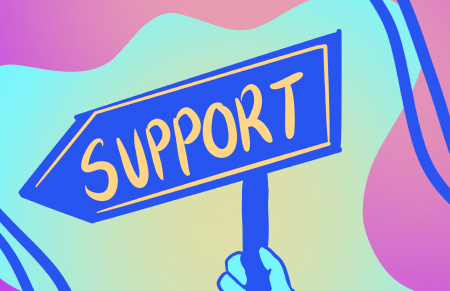.png?sfvrsn=4b87c62f_0)
What to do if you're concerned someone is suicidal
You can’t always tell if a friend or loved one is considering suicide, but there are some common signs that can indicate they may be at risk.
Ask yourself if they’re acting differently or out of character? Have they been through a painful or traumatic event, a loss or a life change recently? Are they under pressure with finances, relationships, work or otherwise?
Sometimes they may not display clear ‘signs’ but there may be some HINTS.
Follow your instincts. They're often right.
Firstly, please take all signs of suicidal behaviour seriously.
If someone tells you they're thinking of suicide or if their behaviour gives you cause for concern, please don’t ignore the situation or play it down. Many people who die by suicide give signs or voice intentions to a confidante at some stage before taking their life.
They may tell you in confidence and ask you not to tell their family or anyone else. You may feel you can’t break this confidence, or that you're overreacting, but the safety of the person at risk needs to be your first priority. This is one instance where keeping a secret is not the right course of action.
Sometimes a person may disclose their suicidal intentions while under the influence of drugs or alcohol. They may subsequently dismiss or deny their intentions. However, these disclosures should also be treated seriously.
Never keep a plan for suicide a secret. Their life is the priority right now, not your relationship with them.
What to do if you see warning signs of Suicide?
If you are concerned about suicide, open the conversation by asking some simple & direct questions. This can help the person acknowledge they are having suicidal thoughts. Your willingness to actively listen in a non-judgemental, non-confrontational way can help them to feel supported enough to open up and to ultimately seek professional help.
How do you broach the subject?
Asking these questions will help you determine if a person is in immediate danger, and needs help. It’s OK to ask these direct questions – it’s OK to use the ‘S’ word.
- “Do you ever feel so bad that you think about Suicide?”
- “Do you have a plan to die by Suicide or to take your life?”
- “Have you thought about when you would do it - today, tomorrow, next week?”
- “Have you thought about what method you would use?”
- "Have you made a suicide plan?"
Remember, your main aim is to ensure the person at risk remains safe and that they get the help they need.
Listening to a friend in distress
When someone is in distress, one of the most powerful things you can do is to help them through their problems & feelings.
- Open Questions: Ask them questions that don’t require a Yes/No answer, - instead of asking “Does this upset you?” try ‘How does that make you feel?”
- Summarise: This demonstrates that you have listened & understood what the person is experiencing e.g. “So, you feel like no one understands you.”
- Reflect: Simply repeating back a key word or phrase encourages the person to expand on what has been said. For example, when someone says “I’ve been having a really tough time”, you can respond with “A tough time?” This encourages the speaker to continue.
- Clarify: If they gloss over an important point or feeling, “Tell me more about….” can help the person clarify these points for themselves.
- Short Words of Encouragement: They may need help to go on with their story. A simple “yes”, “go on”, “I see” may help the person continue and shows you are interested.
- React: The person is often seeking empathy & understanding. “That must have been difficult”, “You’ve had a bad time” can help. Reacting is a simple human touch that is a vital part of building rapport & trust at a difficult time.
Other helpful hints
- Try not to think ahead about what you will say
- Try not to ignore or deny the other person’s feelings
- Try not to talk about yourself of change topics
- Try not to advise, diagnose or criticise
- Try not to pretend you have understood if you haven’t.
The above information is based on the Samaritans model.
What next?
Stick with the person. Don’t leave them on their own.
Ask them if they are under the influence of alcohol or drugs or if have they taken an overdose or any poisons.
If they have injured themselves or you suspect then have overdosed or taken poison, they require immediate medical attention. In these circumstances, you must bring them to their local A&E or call 999 or 112 for an ambulance.
A&E may be challenging for someone who is at their most vulnerable. We've put together some tips here on getting the most from your visit.
A suicidal person needs to see a doctor or health professional immediately. Ensure they avail of one (or more) of the services highlighted in the box below.
If they need urgent assistance
- Bring them to their local A&E or call 999 or 112.
- Call a helpline:
- Samaritans 24/7 on Freephone 116123
- Pieta 24/7 1800 247 247
- Contact Text About It: Text HELLO to 50808 for free 24/7 Crisis Text Support
- Encourage them to talk to their GP to find a therapy that suits them.
- Visit our comprehensive list of crisis helplines and specialist support services here.
- For information and resources for suicide bereavement, click here.
Always take thoughts or plans of Suicide seriously
- Try not to minimise problems - trying to convince a person in crisis that things aren’t that bad, or that they have everything to live for, may only increase their feelings of guilt & hopelessness.
- Don’t try to shame a person into changing their mind. Your opinion of their situation is irrelevant.
- Reassure them that help is available, that what they are experiencing is treatable, and that suicidal feelings are temporary. Life can get better!
- If you feel the person isn’t in immediate danger, acknowledge their pain is legitimate and offer to work together to get help – “Let’s go together & get some help”. This support can come as a great relief, so it is essential that you follow through. Help them to find a doctor or a mental health professional, participate in making the call, or attend the first appointment. If you are in a position to help, don’t presume that persistence is unwanted or intrusive.
7f898f47047a48d587270a424069307f.png?sfvrsn=71f3c7ed_0)

